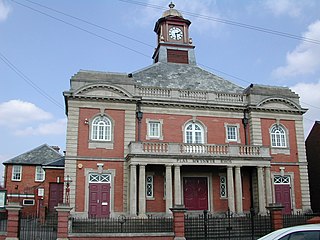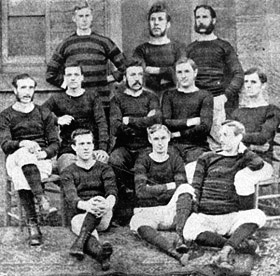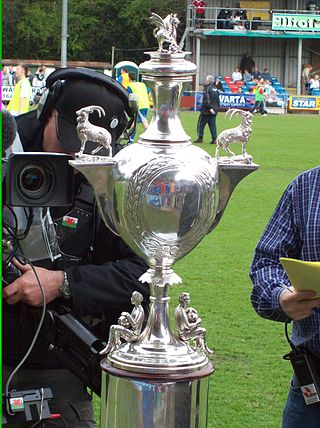| Full name | Llanerchrugog Football Club | |
|---|---|---|
| Nickname(s) | Rhos | |
| Founded | 1876 | |
| Dissolved | 1879 | |
| Ground | Llanerchrugog Park | |
| Secretary | Ll. de Powys Jones | |
Llanerchrugog F.C. was a football club based in Rhosllanerchrugog, Wales.
| Full name | Llanerchrugog Football Club | |
|---|---|---|
| Nickname(s) | Rhos | |
| Founded | 1876 | |
| Dissolved | 1879 | |
| Ground | Llanerchrugog Park | |
| Secretary | Ll. de Powys Jones | |
Llanerchrugog F.C. was a football club based in Rhosllanerchrugog, Wales.

The club was formed in 1876, following a suggestion by the Wrexham Guardian in October that the miners in Rhosllanerchrugog would be as enthusiastic for the game as those who had made up the Druids club; the newspaper had even arranged a practice ground for any side, granted to a new club by a Mr Whalley. [1] The club was duly "got up" by the Messrs. Jones of Llanerchrugog Hall, with one O'Connor as captain, and the club formally christened Llanerchrugog. [2]
The club was sometimes known as Llanerchrugog Hall; the first recorded game for the club, a 1–0 defeat at home to the Civil Service (Wrexham) Cricket and Football Club in February (although the club disputed the goal as being offside), [3] had the club's name in this form. [4] It was also more simply sometimes reported as Rhos. [5]
At the end of its first season, the club had 21 members, [6] which increased to nearly 40 at the end of its second. [7]
The club entered in the first two Welsh Cups, in 1877–78 and 1878–79. In 1877–78 it was lucky enough to receive a bye in the first round, [8] even though four clubs entered after the first round draw had been made, as those four clubs were drawn separately against each other. [9] In the second round, the club was drawn at home to Druids, and lost 3–0, the ground being in a "shocking" state. [10]
The club had struggled through the season, its matches including a 5–0 defeat at Wrexham, [11] but towards the end the side was "greatly improved", demonstrated by a 1–0 win over Llangollen on the Druids' Plasmadoc ground. [12] The club also won through the first round in its second Welsh Cup entry, scoring an 84th-minute equalizer at Gwersyllt Foresters (having dominated the second half) [13] and winning easily at home in the replay, thanks to a T. Evans hat-trick. However Llanerchrugog scratched when paired with Bangor in the second round, [14] and although the club finished out the 1878–79 season, Powys Jones even representing the North Wales FA in goal against the Lancashire FA in February 1879, [15] there is no further record of the club after the end of the season. A new town club was formed in 1889. [16]
The club wore blue jerseys and caps, white knickerbockers, and red stockings. [17]
The club played at the public Llanerchrugog Park, [18] 2½ miles from Ruabon railway station. [19] The site is now the home ground of Rhos Aelwyd.

Cefn Druids Association Football Club is an inactive association football team based in the village of Cefn Mawr, Wrexham. The club played in the Cymru North after being relegated from the Cymru Premier in 2021–22 but withdrew ahead of the 2023-24 season.

Wrexham County Borough is a county borough, with city status, in the north-east of Wales. It borders the English ceremonial counties of Cheshire and Shropshire to the east and south-east respectively, Powys to the south-west, Denbighshire to the west and Flintshire to the north-west. The city of Wrexham is the administrative centre. The county borough is part of the preserved county of Clwyd.

Rhosllanerchrugog is a village and community in Wrexham County Borough, Wales. It lies within the historic county of Denbighshire. The entire built-up area including Penycae, Ruabon and Cefn Mawr had a population of 25,362.

Samuel Llewelyn Kenrick was a Welsh solicitor who became the founder of the Football Association of Wales and organised the first Welsh international football match against Scotland in 1876. As such he became the "father of Welsh football".

The 1877–78 Welsh Cup was the first season of the Welsh Cup. The cup was won by Wrexham who defeated Druids 1–0 in the final.
The 1878–79 Welsh Cup was the second season of the Welsh Cup. The cup was won by Newtown White Star who defeated Wrexham 1–0 in the final.
Ruabon Druids F.C. were a football club based in the village of Ruabon near Wrexham, Wales. The club was founded in October 1872 as 'Ruabon Rovers F.C.' by David Thomson and his brother, George, of Ruabon. In 1874 Ruabon Rovers F.C. became Plasmadoc F.C. before changing their name to Druids F.C. in 1876.
Daniel Grey was a Welsh medical practitioner who was prominent in the early days of Welsh football, making two appearances for the Wales national football team in the 1870s.
George Frederick Thomson was a Welsh amateur footballer who helped found the Druids club and played for Wales in their first two international matches.
William Williams was a Welsh amateur footballer who played most of his football career with the Druids club of Ruabon. Generally playing at half-back, he made eleven appearances for Wales between 1876 and 1883.
Edwin Alfred Cross was a Welsh amateur footballer who played most of his football career with Wrexham, with whom he won the inaugural Welsh Cup in 1878. Playing at half back, he also made two appearances for Wales in 1876 and 1877.
Alfred Davies was a Welsh amateur footballer who played most of his football career with Wrexham, with whom he won the inaugural Welsh Cup in 1878. Playing at outside-left, he also made two appearances for Wales in 1876 and 1877.

The 1882–83 FAW Welsh Cup was the sixth edition of the annual knockout tournament for competitive football teams in Wales.
The North Wales Miners' Association was a trade union representing coal miners in Wales.
James Davies (1845–1910) was a Welsh international footballer. He was part of the Wales national football team, playing 1 match on 23 March 1878 against Scotland.
Gwersyllt Foresters were a Welsh football team from the village of Gwersyllt, Wrexham.
Llangollen Football and Athletic Club were a Welsh football team from Llangollen, Denbighshire.
Rhosllanerchrugog F.C. was a football club based in Rhosllanerchrugog, Wales. The club was often simply called Rhos.

Carnarvon Athletic F.C. was an association football club from Caernarfon in north Wales.